专八阅读翻译训练之一
- 格式:doc
- 大小:85.50 KB
- 文档页数:13
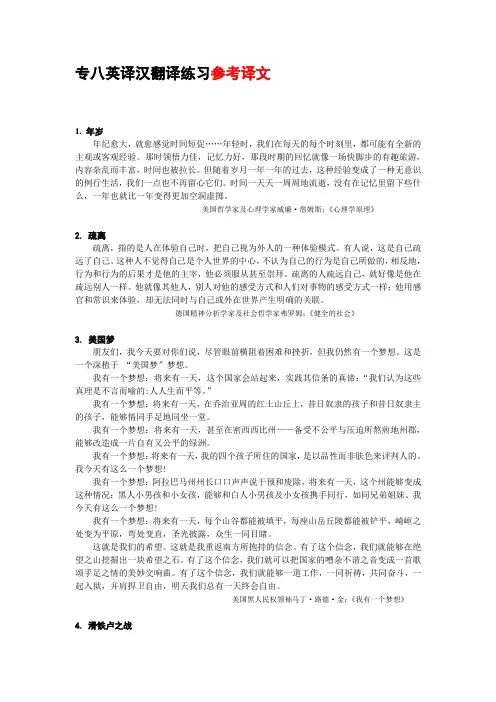
专八英译汉翻译练习参考译文1. 年岁年纪愈大,就愈感觉时间短促……年轻时,我们在每天的每个时刻里,都可能有全新的主观或客观经验。
那时领悟力佳,记忆力好,那段时期的回忆就像一场快脚步的有趣旅游,内容杂乱而丰富,时间也被拉长。
但随着岁月一年一年的过去,这种经验变成了一种无意识的例行生活,我们一点也不再留心它们。
时间一天天一周周地流逝,没有在记忆里留下些什么,一年也就比一年变得更加空洞虚掷。
美国哲学家及心理学家威廉·詹姆斯:《心理学原理》2. 疏离疏离,指的是人在体验自己时,把自己视为外人的一种体验模式。
有人说,这是自己疏远了自己。
这种人不觉得自己是个人世界的中心,不认为自己的行为是自己所做的,相反地,行为和行为的后果才是他的主宰,他必须服从甚至崇拜。
疏离的人疏远自己,就好像是他在疏远别人一样。
他就像其他人,别人对他的感受方式和人们对事物的感受方式一样;他用感官和常识来体验,却无法同时与自己或外在世界产生明确的关联。
德国精神分析学家及社会哲学家弗罗姆:《健全的社会》3. 美国梦朋友们,我今天要对你们说,尽管眼前横阻着困难和挫折,但我仍然有一个梦想。
这是一个深植于“美国梦”梦想。
我有一个梦想:将来有一天,这个国家会站起来,实践其信条的真谛:“我们认为这些真理是不言而喻的:人人生而平等。
”我有一个梦想:将来有一天,在乔治亚周的红土山丘上,昔日奴隶的孩子和昔日奴隶主的孩子,能够情同手足地同坐一堂。
我有一个梦想:将来有一天,甚至在密西西比州——备受不公平与压迫所熬煎地州郡,能够改造成一片自有又公平的绿洲。
我有一个梦想:将来有一天,我的四个孩子所住的国家,是以品性而非肤色来评判人的。
我今天有这么一个梦想!我有一个梦想:阿拉巴马州州长口口声声说干预和废除,将来有一天,这个州能够变成这种情况:黑人小男孩和小女孩,能够和白人小男孩及小女孩携手同行,如同兄弟姐妹。
我今天有这么一个梦想!我有一个梦想:将来有一天,每个山谷都能被填平,每座山岳丘陵都能被铲平,崎岖之处变为平原,弯处变直,圣光披露,众生一同目睹。
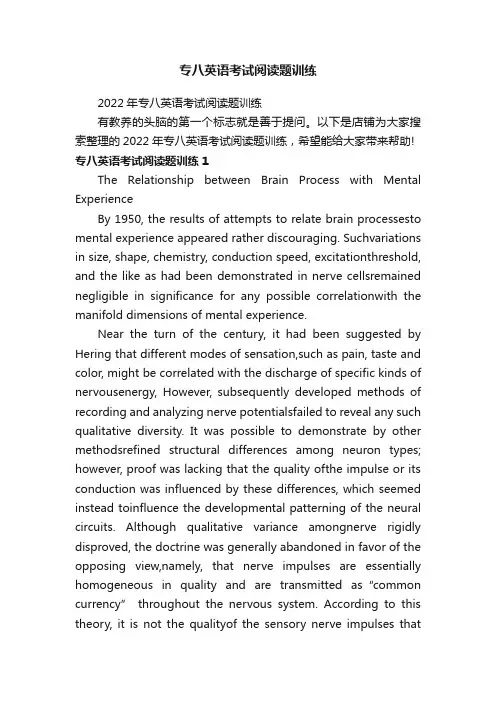
专八英语考试阅读题训练2022年专八英语考试阅读题训练有教养的头脑的第一个标志就是善于提问。
以下是店铺为大家搜索整理的2022年专八英语考试阅读题训练,希望能给大家带来帮助! 专八英语考试阅读题训练1The Relationship between Brain Process with Mental ExperienceBy 1950, the results of attempts to relate brain processesto mental experience appeared rather discouraging. Suchvariations in size, shape, chemistry, conduction speed, excitationthreshold, and the like as had been demonstrated in nerve cellsremained negligible in significance for any possible correlationwith the manifold dimensions of mental experience.Near the turn of the century, it had been suggested by Hering that different modes of sensation,such as pain, taste and color, might be correlated with the discharge of specific kinds of nervousenergy, However, subsequently developed methods of recording and analyzing nerve potentialsfailed to reveal any such qualitative diversity. It was possible to demonstrate by other methodsrefined structural differences among neuron types; however, proof was lacking that the quality ofthe impulse or its conduction was influenced by these differences, which seemed instead toinfluence the developmental patterning of the neural circuits. Although qualitative variance amongnerve rigidly disproved, the doctrine was generally abandoned in favor of the opposing view,namely, that nerve impulses are essentially homogeneous in quality and are transmitted as“common currency” throughout the nervous system. According to this theory, it is not the qualityof the sensory nerve impulses thatdetermines the diverse conscious sensations they produce,but, rather, the different areas of the brain into which they discharge, and there is some evidencefor this view. In one experiment, when an electric stimulus was applied to a given sensory field ofthe cerebral cortex of a conscious human subject, it produced a sensation of the appropriatemodality for that particular locus, that is, a visual sensation from the visual cortex, an auditorysensation from the auditory cortex, and so on. Other experiments revealed slight variations in thesize, number, arrangement, and interconnection of the nerve cells, but as for as psychoneuralcorrelations were concerned, the obvious similarities of these sensory fields to each other seemedmuch more remarkable than any of the minute differences.However, cortical as diverse as those of red, black, green and white, or touch, cold, warmth,movement, pain, posture and pressure apparently may arise through activation of the samecortical areas. What seemed to remain was some kind of differential patterning effects in the brainexcitation: it is the difference in the central distribution of impulses that counts. In short, Braintheory suggested a correlation between mental experience and the activity of relativelyhomogenous nerve-cell units conducting essentially homogeneous impulses throughhomogeneous cerebral tissue. To match the multiple dimensions of mental experiencepsychologists could only point to a limitless variation in the spatiotemporal patterning of nerveimpulses.1. Up until 1950, efforts to establish that brain processes and mental experience are related wouldmost likely have been met with[A] vexation [B] irritability [C] discouragement [D] neutrality2. The author mentions “common currency” primarily in order to emphasize the[A] lack of differentiation among nerve impulses in human beings.[B] similarities in the views of the scientists.[C] similarity of sensations of human beings.[D] continuous passage of nerve impulses through the nervous system.3. Which of the following theories is reinforced by the depiction of the experiment in lines 16—19?[A] Cognitive experience manifested by sensory nerve impulses are influenced by the area of thebrain stimulated.[B] Qualitative diversity in nerve potentials can now be studied more accurately.[C] Sensory stimuli are heterogeneous and are greatly influenced by the nerve sensors theyproduce.[D] Differentiation in neural modalities influences the length of nerve transmissions.4. It can be inferred from the passage that which of the following exhibit the LEAST qualitativevariation?[A] Nerve cells. [B] Nerve impulses.[C] Cortical areas. [C] Spatial patterns of nerve impulses.答案详解:1. C. 令人失望。
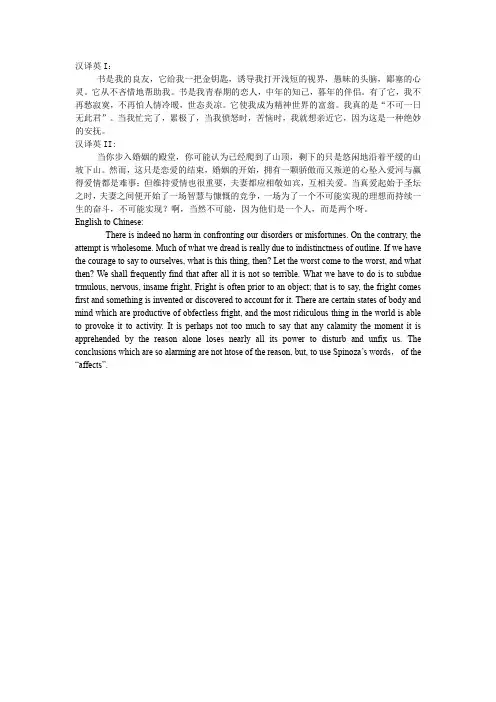
汉译英I:书是我的良友,它给我一把金钥匙,诱导我打开浅短的视界,愚昧的头脑,鄙塞的心灵。
它从不吝惜地帮助我。
书是我青春期的恋人,中年的知己,暮年的伴侣。
有了它,我不再愁寂寞,不再怕人情冷暖,世态炎凉。
它使我成为精神世界的富翁。
我真的是“不可一日无此君”。
当我忙完了,累极了,当我愤怒时,苦恼时,我就想亲近它,因为这是一种绝妙的安抚。
汉译英II:当你步入婚姻的殿堂,你可能认为已经爬到了山顶,剩下的只是悠闲地沿着平缓的山坡下山。
然而,这只是恋爱的结束,婚姻的开始,拥有一颗骄傲而又叛逆的心坠入爱河与赢得爱情都是难事;但维持爱情也很重要,夫妻都应相敬如宾,互相关爱。
当真爱起始于圣坛之时,夫妻之间便开始了一场智慧与慷慨的竞争,一场为了一个不可能实现的理想而持续一生的奋斗,不可能实现?啊,当然不可能,因为他们是一个人,而是两个呀。
English to Chinese:There is indeed no harm in confronting our disorders or misfortunes. On the contrary, the attempt is wholesome. Much of what we dread is really due to indistinctness of outline. If we have the courage to say to ourselves, what is this thing, then? Let the worst come to the worst, and what then? We shall frequently find that after all it is not so terrible. What we have to do is to subdue trmulous, nervous, insame fright. Fright is often prior to an object; that is to say, the fright comes first and something is invented or discovered to account for it. There are certain states of body and mind which are productive of obfectless fright, and the most ridiculous thing in the world is able to provoke it to activity. It is perhaps not too much to say that any calamity the moment it is apprehended by the reason alone loses nearly all its power to disturb and unfix us. The conclusions which are so alarming are not htose of the reason, but, to use Spinoza’s words,of the “affects”.。
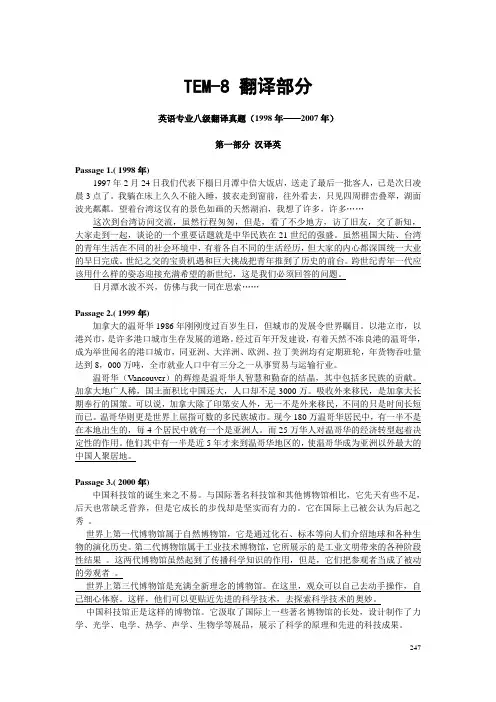
TEM-8 翻译部分英语专业八级翻译真题(1998年——2007年)第一部分汉译英Passage 1.( 1998年)1997年2月24日我们代表下榻日月潭中信大饭店,送走了最后一批客人,已是次日凌晨3点了。
我躺在床上久久不能入睡,披衣走到窗前,往外看去,只见四周群峦叠翠,湖面波光粼粼。
望着台湾这仅有的景色如画的天然湖泊,我想了许多,许多……这次到台湾访问交流,虽然行程匆匆,但是,看了不少地方,访了旧友,交了新知,大家走到一起,谈论的一个重要话题就是中华民族在21世纪的强盛。
虽然祖国大陆、台湾的青年生活在不同的社会环境中,有着各自不同的生活经历,但大家的内心都深国统一大业的早日完成。
世纪之交的宝贵机遇和巨大挑战把青年推到了历史的前台。
跨世纪青年一代应该用什么样的姿态迎接充满希望的新世纪,这是我们必须回答的问题。
日月潭水波不兴,仿佛与我一同在思索……Passage 2.( 1999年)加拿大的温哥华1986年刚刚度过百岁生日,但城市的发展令世界瞩目。
以港立市,以港兴市,是许多港口城市生存发展的道路。
经过百年开发建设,有着天然不冻良港的温哥华,成为举世闻名的港口城市,同亚洲、大洋洲、欧洲、拉丁美洲均有定期班轮,年货物吞吐量达到8,000万吨,全市就业人口中有三分之一从事贸易与运输行业。
温哥华(Vancouver)的辉煌是温哥华人智慧和勤奋的结晶,其中包括多民族的贡献。
加拿大地广人稀,国土面积比中国还大,人口却不足3000万。
吸收外来移民,是加拿大长期奉行的国策。
可以说,加拿大除了印第安人外,无一不是外来移民,不同的只是时间长短而已。
温哥华则更是世界上屈指可数的多民族城市。
现今180万温哥华居民中,有一半不是在本地出生的,每4个居民中就有一个是亚洲人。
而25万华人对温哥华的经济转型起着决定性的作用。
他们其中有一半是近5年才来到温哥华地区的,使温哥华成为亚洲以外最大的中国人聚居地。
Passage 3.( 2000年)中国科技馆的诞生来之不易。
![[英语]专八翻译练习及答案](https://uimg.taocdn.com/24a70172a98271fe910ef9cd.webp)
专八翻译练习及答案 在兽类中我最爱虎,在虎的故事中我最爱下面的一个。 深山中有一所古庙,几个和尚在那里过着单调的修行生活。同他们做朋友的,除了有时上山来的少数乡下人外,就是几只猛虎。虎不惊扰僧人,却替他们守护庙宇。作为报酬,和尚把一些可吃的东西放在庙门前。每天傍晚,夕阳染红小半个天空,虎们成群地走到庙门口,吃了东西,跳跃而去。庙门大开,僧人们安然在庙内做他们的日课,也没有谁出去看虎怎样吃东西,即使偶尔有一二和尚立在门前,虎们亦视为平常的事情,把他们看做熟人,不去惊动,却斯斯文文地吃完走开。如果看不见僧人,虎就发出几声长啸,随着几阵风飞腾而去。 SECTION B ENGLISH TO CHINESE Translate the underlined part of the text into Chinese. When the Romantic Movement was still in its first fervor, it was a common matter of debate whether people should marry for love or for money. The young people concerned usually favored love, and their parents usually favored money. In the novels of the period, the dilemma was felicitously solved by the discovery, on the last page, that the apparently penniless heroine was really a great heiress. But in real life young men who hoped for this denouement were apt to be disappointed. Prudent parents, while admitting that their daughters should marry for love, took care that all the young men they met should be rich. This method was sometimes very successful; it was adopted, for example, by my maternal grandfather, who had a large number of romantic daughters, none of whom married badly. In these days of psychology the matter no longer looks so simple as it did eighty years ago. We realize now that money may be the cause, or part of the cause, of quite genuine love; of this there are notable examples in history.
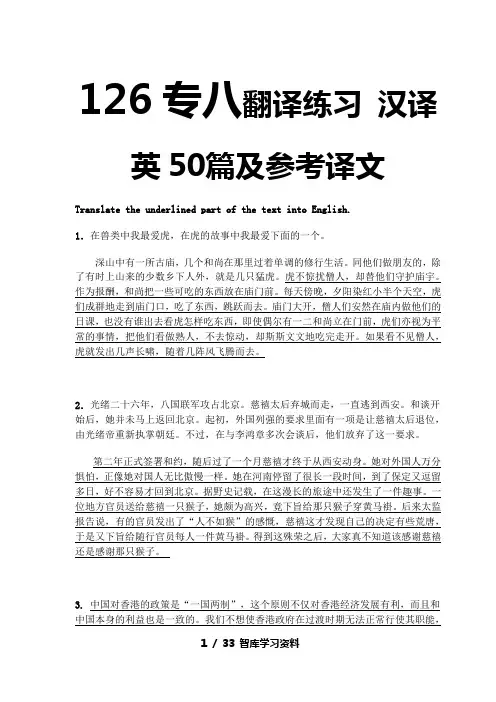
126专八翻译练习汉译英50篇及参考译文Translate the underlined part of the text into English.1.在兽类中我最爱虎,在虎的故事中我最爱下面的一个。
深山中有一所古庙,几个和尚在那里过着单调的修行生活。
同他们做朋友的,除了有时上山来的少数乡下人外,就是几只猛虎。
虎不惊扰僧人,却替他们守护庙宇。
作为报酬,和尚把一些可吃的东西放在庙门前。
每天傍晚,夕阳染红小半个天空,虎们成群地走到庙门口,吃了东西,跳跃而去。
庙门大开,僧人们安然在庙内做他们的日课,也没有谁出去看虎怎样吃东西,即使偶尔有一二和尚立在门前,虎们亦视为平常的事情,把他们看做熟人,不去惊动,却斯斯文文地吃完走开。
如果看不见僧人,虎就发出几声长啸,随着几阵风飞腾而去。
2.光绪二十六年,八国联军攻占北京。
慈禧太后弃城而走,一直逃到西安。
和谈开始后,她并未马上返回北京。
起初,外国列强的要求里面有一项是让慈禧太后退位,由光绪帝重新执掌朝廷。
不过,在与李鸿章多次会谈后,他们放弃了这一要求。
第二年正式签署和约,随后过了一个月慈禧才终于从西安动身。
她对外国人万分惧怕,正像她对国人无比傲慢一样。
她在河南停留了很长一段时间,到了保定又逗留多日,好不容易才回到北京。
据野史记载,在这漫长的旅途中还发生了一件趣事。
一位地方官员送给慈禧一只猴子,她颇为高兴,竟下旨给那只猴子穿黄马褂。
后来太监报告说,有的官员发出了“人不如猴”的感慨,慈禧这才发现自己的决定有些荒唐,于是又下旨给随行官员每人一件黄马褂。
得到这殊荣之后,大家真不知道该感谢慈禧还是感谢那只猴子。
3. 中国对香港的政策是“一国两制”,这个原则不仅对香港经济发展有利,而且和中国本身的利益也是一致的。
我们不想使香港政府在过渡时期无法正常行使其职能,恰恰相反,我们希望它能有效地管理香港的事务,中英联合声明和建造新机场的谅解备忘录就是最好的保证。
至于1997年以后的,全国人民大会已通过了《中华人民共和国香港特别行政区基本法》。
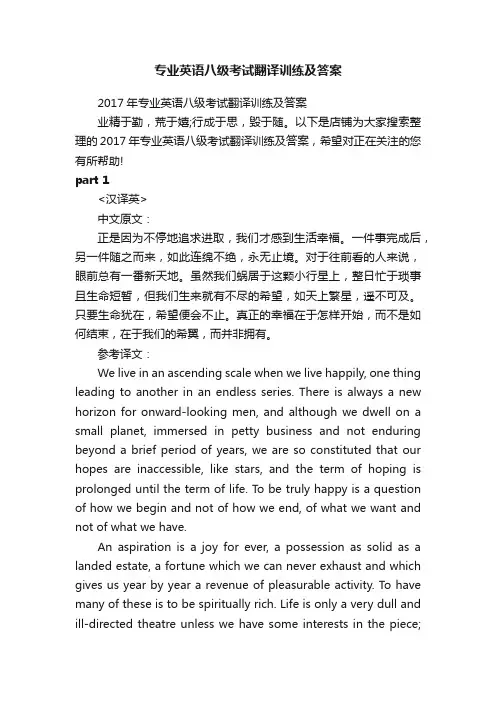
专业英语八级考试翻译训练及答案2017年专业英语八级考试翻译训练及答案业精于勤,荒于嬉;行成于思,毁于随。
以下是店铺为大家搜索整理的2017年专业英语八级考试翻译训练及答案,希望对正在关注的您有所帮助!part 1<汉译英>中文原文:正是因为不停地追求进取,我们才感到生活幸福。
一件事完成后,另一件随之而来,如此连绵不绝,永无止境。
对于往前看的人来说,眼前总有一番新天地。
虽然我们蜗居于这颗小行星上,整日忙于琐事且生命短暂,但我们生来就有不尽的希望,如天上繁星,遥不可及。
只要生命犹在,希望便会不止。
真正的幸福在于怎样开始,而不是如何结束,在于我们的希翼,而并非拥有。
参考译文:We live in an ascending scale when we live happily, one thing leading to another in an endless series. There is always a new horizon for onward-looking men, and although we dwell on a small planet, immersed in petty business and not enduring beyond a brief period of years, we are so constituted that our hopes are inaccessible, like stars, and the term of hoping is prolonged until the term of life. T o be truly happy is a question of how we begin and not of how we end, of what we want and not of what we have.An aspiration is a joy for ever, a possession as solid as a landed estate, a fortune which we can never exhaust and which gives us year by year a revenue of pleasurable activity. To have many of these is to be spiritually rich. Life is only a very dull and ill-directed theatre unless we have some interests in the piece;and to those who have neither art nor science, the world is a mere arrangement of colours, or a rough footway where they may very well break their shins.参考译文:渴望是永远的乐趣,一笔如地产般真实稳固的财富,用之不尽,取之不竭。
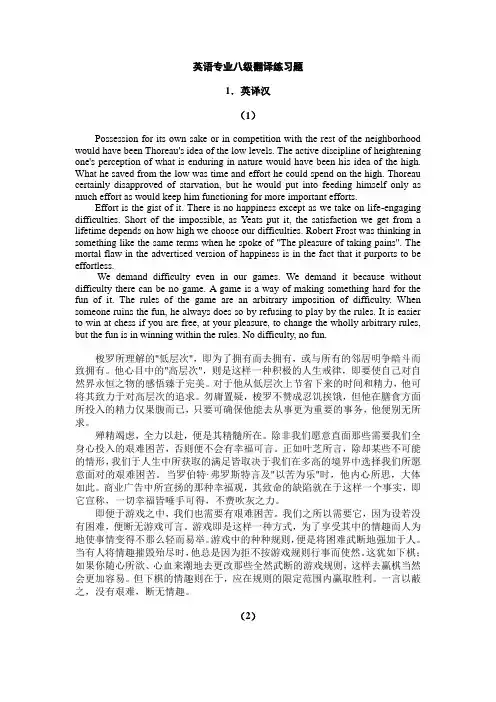
英语专业八级翻译练习题1.英译汉(1)Possession for its own sake or in competition with the rest of the neighborhood would have been Thoreau's idea of the low levels. The active discipline of heightening one's perception of what is enduring in nature would have been his idea of the high. What he saved from the low was time and effort he could spend on the high. Thoreau certainly disapproved of starvation, but he would put into feeding himself only as much effort as would keep him functioning for more important efforts.Effort is the gist of it. There is no happiness except as we take on life-engaging difficulties. Short of the impossible, as Yeats put it, the satisfaction we get from a lifetime depends on how high we choose our difficulties. Robert Frost was thinking in something like the same terms when he spoke of "The pleasure of taking pains". The mortal flaw in the advertised version of happiness is in the fact that it purports to be effortless.We demand difficulty even in our games. We demand it because without difficulty there can be no game. A game is a way of making something hard for the fun of it. The rules of the game are an arbitrary imposition of difficulty. When someone ruins the fun, he always does so by refusing to play by the rules. It is easier to win at chess if you are free, at your pleasure, to change the wholly arbitrary rules, but the fun is in winning within the rules. No difficulty, no fun.梭罗所理解的"低层次",即为了拥有而去拥有,或与所有的邻居明争暗斗而致拥有。
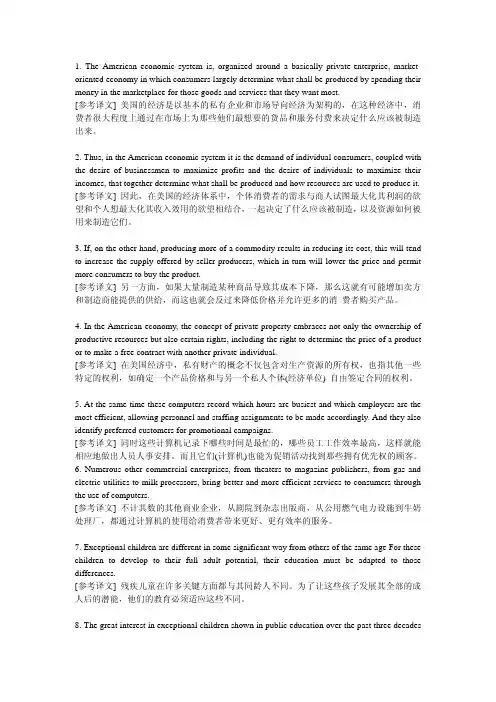
1. The American economic system is, organized around a basically private-enterprise, market- oriented economy in which consumers largely determine what shall be produced by spending their money in the marketplace for those goods and services that they want most.[参考译文] 美国的经济是以基本的私有企业和市场导向经济为架构的,在这种经济中,消费者很大程度上通过在市场上为那些他们最想要的货品和服务付费来决定什么应该被制造出来。
2. Thus, in the American economic system it is the demand of individual consumers, coupled with the desire of businessmen to maximize profits and the desire of individuals to maximize their incomes, that together determine what shall be produced and how resources are used to produce it. [参考译文] 因此,在美国的经济体系中,个体消费者的需求与商人试图最大化其利润的欲望和个人想最大化其收入效用的欲望相结合,一起决定了什么应该被制造,以及资源如何被用来制造它们。
3. If, on the other hand, producing more of a commodity results in reducing its cost, this will tend to increase the supply offered by seller-producers, which in turn will lower the price and permit more consumers to buy the product.[参考译文] 另一方面,如果大量制造某种商品导致其成本下降,那么这就有可能增加卖方和制造商能提供的供给,而这也就会反过来降低价格并允许更多的消费者购买产品。
Stratford-on-Avon, as we all know, has only one industry-William Shakespeare-but there are two distinctly separate and increasingly hostile branches. There is the Royal Shakespeare Company (RSC), which presents superb productions of the plays at the Shakespeare Memorial Theatre on the Avon. And there are the townsfolk who largely live off the tourists who come, not to see the plays, but to look at Anne Hathaway‘s Cottage, Shakespeare‘s birthplace and the other sights.The worthy residents of Stratford doubt that the theatre adds a penny to their revenue. They frankly dislike the RSC‘s actors, them with their long hair and beards and sandals and noisiness. It‘s all deliciously ironic when you consider that S hakespeare, who earns their living, was himself an actor (with a beard) and did his share of noise - making.The tourist streams are not entirely separate. The sightseers who come by bus- and often take in Warwick Castle and Blenheim Palace on the side –don‘t usually see the plays, and some of them are even surprised to find a theatre in Stratford. However, the playgoers do manage a little sight - seeing along with their play going. It is the playgoers, the RSC contends, who bring in much of the town‘s revenue because they spend the night (some of them four or five nights) pouring cash into the hotels and restaurants. The sightseers can take in everything and get out of town by nightfall.The townsfolk don‘t see it this way and local council does not contribute directly to the subsidy of the Royal Shakespeare Company. Stratford cries poor traditionally. Nevertheless every hotel in town seems to be adding a new wing or cocktail lounge. Hilton is building its own hotel there, which you may be sure will be decorated with Hamlet Hamburger Bars, the Lear Lounge, the Banquo Banqueting Room, and so forth, and will be very expensive.Anyway, the townsfolk can‘t understand why the Royal Shakespea re Company needs a subsidy. (The theatre has broken attendance records for three years in a row. Last year its 1,431 seats were 94 per cent occupied all year long and this year they‘ll do better.) The reason, of course, is that costs have rocketed and ticket prices have stayed low.It would be a shame to raise prices too much because it would drive away the young people who are Stratford‘s most attractive clientele. They come entirely for the plays, not the sights. They all seem to look alike (though they come from all over) –lean, pointed, dedicated faces, wearing jeans and sandals, eating their buns and bedding down for the night on the flagstones outside the theatre to buy the 20 seats and 80 standing-room tickets held for the sleepers and sold to them when the box office opens at 10:30 a.m.1. From the first two paragraphs , we learn thatA. the townsfolk deny the RSC ‘ s contribution to the town‘s revenueB. the actors of the RSC imitate Shakespeare on and off stageC. the two branches of the RSC are not on good termsD. the townsfolk earn little from tourism2. It can be inferred from Paragraph 3 thatA. the sightseers cannot visit the Castle and the Palace separatelyB. the playgoers spend more money than the sightseersC. the sightseers do more shopping than the playgoersD. the playgoers go to no other places in town than the theater3. By saying ―Stratford cries poor traditionally‖ (Line 2-3, Paragraph 4), the author implies thatA. Stratford cannot afford the expansion projectsB. Stratford has long been in financial difficultiesC. the town is not really short of moneyD. the townsfolk used to be poorly paid4. According to the townsfolk, the RSC deserves no subsidy becauseA. ticket prices can be raised to cover the spendingB. the company is financially ill-managedC. the behavior of the actors is not socially acceptableD. the theatre attendance is on the rise5. From the text we can conclude that the authorA. is supportive of both sidesB. favors the townsfolk‘s viewC. takes a detached attitudeD. is sympathetic to the RSC.参考答案:A B C D DTEXT ARicci‘s ―Operation Columbus‖Ricci, 45, is now striking out on perhaps his boldest venture yet. He plan s to market an English language edition of his elegant monthly art magazine, FMR , in the United States. Once again the skeptice are murmuring that the successfu l Ricci has headed for a big fall. And once again Ricci intends to prove them wr ong.Ricci is so confident t hat he has christened his quest ―Operation Columbu s‖ and has set his sights on discovering an American readership of 300,000. That goal may not be too far-fetched. The Italian edition of FMR — the initials, of course, stand for Franco Maria Ricci-is only 18 months old. But it is already the second largest art magazine in the world, with a circulation of 65,000 and a profit margin of US $ 500,000. The American edition will be patterned after th e Italian version, with each 160-page issue carrying only 40 pages of ads and no more than five articles. But the contents will often differ. The English-langua ge edition will include more American works, Ricci says, to help Americans get o ver ―an inferiority complex about their art.‖ He also hopes that the magazine will become a vehicle for a two -way cultural exchange — what he likes to think of as a marriage of brains, culture and taste from both sides of the Atlantic.To realize this vision, Ricci is mounting one of the most lavish, enterpris ing —and expensive-promotional campaigns in magazine —publishing history. Between November and January, eight jumbo jets will fly 8 million copies of a sample 16-page edition of FMR across the Atlantic. From a warehouse in Michigan, 6.5 million copies will be mailed to American subscribers of various cultural, art and business magazines. Some of the remaining copies will circulate as a spe cial Sunday supplement in the New York Times. The cost of launching Operation Co lumbus is a staggering US $ 5 million, but Ricci is hoping that 60% of the price tag will be financed by Italian corporations.― To land in America Columbus had to use Spanish sponsors,‖ reads one sentence in his promotional pamphlet. ―We would like Italians.‖Like Columbus, Ricci cannot know what his reception will be on foreign shor es. In Italy he gambled — and won — on a simple concept: it is more important to show art than to write about it. Hence, one issue of FMR might feature 32 fu ll-colour pages of 17th-century tapestries, followed by 14 pages of outrageous e yeglasses. He is gambling that the concept is exportable. ―I don‘t expect that more than 30% of my reader... will actually read FMR,‖ he says. ―The magazine is such a visual delight that they don‘t have to.‖ Still, he is lining up an impr es sive stable of writers and professors for the American edition , including Noam Chomsky, Anthony Burgess, Eric Jong and Norman Mailer. In addition, he seems to be pursuing his won eclectic vision without giving a moment‘s thought to such e s tablished competitors as Connosisseur and Horizon. ―The Americans can do almost everything better than we can,‖ says Rieci, ―But we(the Italians)have a 2,000 year edge on them in art.‖16. Ricci intends his American edition of FMR to carry more American art works in order to___.A. boost Americans‘ confidenc e in their artB. follow the pattern set by his Italian editionC. help Italians understand American art betterD. expand the readership of his magazine17. Ricci is compared to Columbus in the passage mainly because___.A. they both benefited from Italian sponsorsB. they were explorers in their own waysC. they obtained overseas sponsorshipD. they got a warm reception in America18. We get the impression that the American edition of FMR will probably ___.A. carry many academic articles of high standardB. follow the style of some famous existing magazinesC. be mad by one third of American magazine readersD. pursue a distinctive editorial style of its ownTEXT BMy mother‘s relations were very different fro m the Mitfords. Her brother, Uncle Geoff, who often came to stay at Swimbrook, was a small spare man with th oughtful blue eyes and a rather silent manner. Compared to Uncle Tommy, he was a n intellectual of the highest order, and indeed his satirical pen belied his mil d demeanor. He spent most of his waking hours composing letters to The Times and other publications in which he outlined his own particular theory of the develo pment of English history. In Uncle Geoff‘s view, the greatness of England had r isen and waned over the centuries in direct proportion to the use of natural man ure in fertilizing the soil. The Black Death of 1348 was caused by gradual loss of the humus fertility found under forest trees. The rise of the Elizabethans tw o centuries later was attributable to the widespread use of sheepmanure.Many of Uncle Geoff‘s letters-to-the-editor have fortunately been preserv ed in a privately printed volume called Writings of a Rebel. Of the collection, one letter best sums up his views on the relationship between manure and freedom. He wrote:Collating old records shows that our greatness rises and falls with the li ving fertility of our soil. And now, many years of exhausted and chemically murd ered soil, and of devitalized food from it, has softened our bodies and still wo rse, softened our national character. It is an actual fact that character is lar gely a product of the soil. Many years of murdered food from deadened soil has m ade us too tame. Chemicals have had their poisonous day. It is now the worm‘s t urn to reform the manhood of England. The only way to regain our punch, our char acter, our lost virtues, and with them the freedom natural to islanders, is to c o mpost our land so as to allow moulds, bacteria and earthworms to remake living s oil to nourish Englishmen‘s bodies and spirits.The law requiring pasteurization of milk in England was a particular targe t of Uncle Geoff‘s. Fond of alliteration, he dubbed it ―Murdered Milk Measure ‖, and established the Liberty Restoration League, with headquarters at his house i n London, for the specific purpose of organizing a counteroffensive. ―Freedom n o t Doctordom‖ was the League‘s proud slogan. A subsidiary, but nevertheless imp or tant, activity of the League was advocacy of a return to the ―unsplit, slowly s m oked fish‖ and bread made with ―English stone-ground flour, yeast, milk, sea s alt and raw cane-sugar.‖19. According to Uncle Geoff, national strength could only be regained by ___.A. reforming the manhood of EnglandB. using natural manure as fertilizerC. eating more bacteria-free foodD. granting more freedom to Englishmen20. The tone of the passage can most probably be described as___.A. facetiousB. seriousC. nostalgicD. factualTEXT CInterviewSo what have they taught you at college about interviews? Some courses go t o town on it, others do very little. You may get conflicting advice. Only one th ing is certain: the key to success is preparation.There follow some useful suggestions from a teacher training course co-ordi nator, a head of department and a headteacher. As they appear to be in complete harmony with one another despite never having met, we may take their advice seri ously.O xford Brookes University‘s approach to the business of application and in t erview focuses on research and rehearsal. Training course co-ordinator Brenda St evens speaks of the value of getting students ―to deconstruct the advertisement , see what they can offer to that school, and that situation, and then write the letter, do their CVs and criticize each other‘s.‖ Finally, they role play inte rviewer and interviewee.T his is sterling stuff, and Brookes students spend a couple of weeks on it. ―The better prepared students won‘t be thrown by nerves on the day, ‖says Ms St evens. ―They‘ll have their strategies and questions worked out. ‖ She also sa ys, a trifle disconcertingly, ―the better the student, the worse the interviewee. ‖ She believes the most capable students are less able to put themselves forward. Even if this were tree, says Ms Stevens, you must still make your own case.―Beware of infernality,‖ s he advises. One aspirant teacher, now a head of d epartment at a smart secondary school, failed his first job interview because he took his jacket off while waiting for his appointment. It was hot and everyone in the staffroom was in shirtsleeves but at the end of the day they criticized h is casual attitude, which they had deduced from the fact that he took his jacket off in the staffroom, even though he put it back on for the interview.I ncidentally, men really do have to wear a suit to the interview and women really cannot wear jeans, even if men never wear the suit again and women teach most days in jeans. Panels respond instantly to these indicators. But beware: it will not please them any better if you are too smart.F ind out about the people who will talk to you. In the early meetings they are likely to be heads of departments or heads of year. Often they may be concer ned with pastoral matters. It makes sense to know their priorities and let them hear the things about you that they want to hear.D uring preliminary meetings you may be seen in groups with two or three oth er applicants and you must demonstrate that you know your stuff without putting your companions down. The interviewers will be watching how you work with a teamBut remember the warning about informality: however friendly and co-operat ive the other participants are, do not give way to the idea that you are there j ust to be friends.R outin e questions can be rehearsed, but ―don‘t go on too long,‖ advises th e department head. They may well ask: ―What have been your worst/best moments w h en teaching?‖, or want you to ―talk about some good teaching you have done. ‖ The experts agree you shoul d recognize your weaknesses and offer a strategy for over coming them. ―I know I‘ve got to work on classroom management —I would hope fo r some help,‖ perhaps. No one expects a new teacher to know it all, but they ho pe for an objective appraisal of capabilities.Be warned against inexpert questioning. You may be asked questions in such a way that it seems impossible to present your best features. Some questions may be plain silly, asked perhaps by people on the panel who are from outside the s ituation. Do not be thrown, have ways of circumnavigating it, and never, ever le t them see that you think they have said somethingfoolish.Y ou will almost certainly be asked how you see the future and it is import ant to have a good answer prepared. Some people are put off by being asked what they expect to be doing in five or ten years‘ time. On your preliminary visit, s ays the department head, be sure to give them a bit of an interview of your own, to see the direction the department is going and what you could contribute to i t.The headteacher offers his thoughts in a nine-point plan. Iron the application form! Then it stands out from everyone else‘s, which have been folded and battered in the post. It gives an initial impression which may get your application to the top of the pile. Ensure that your application is tailored to the particular school. Make the hea d feel you are writing directly to him or her. Put yourself at ease before you meet the interviewing panel: if you are nervous , you will talk too quickly. Before you enter the room remember that the people are human beings too; take away the mystique of their roles. Listen. There is a danger of not hearing accurately what is being said. Make ey e contact with the speakers, and with everyone in the room. Allow your warmth and humanity to be seen. A sense of humour is very important.Have a portfolio of your work that can link theory to practice. Many sch ools wa nt you to show work. For a primary appointment, give examples from the range of the curriculum, not just art. (For this reason, taking pictures on your teaching practice is important. ) Prepare yourself in case you are asked to give a talk. Have p rompt cards ready, and don‘t waffle.Y our speech must be clear and articulate, with correct grammar. This is importa nt: they want to hear you and they want to hear how well you can communicate wit h children. Believe in yourself and have confidence.Some of the people asking the questions don‘t know much about what you do. B e ready to help them.T hus armed, you should have no difficulty at all. Good luck and keep your jac ket on!21. Ms. Brenda Stevens suggests that before applying job applicants should ___.A. go through each other‘s CVsB. rehearse their answers to questionsC. understand thoroughly the situationsD. go to town to attend training course22. Is it wise to admit some of your weaknesses relating to work?A. Yes, but you should have ideas for improvement in the future.B. Yes, because it is natural to be weak in certain aspects.C. No, admitting weaknesses may put you at a disadvantage.D. No, it will only prompt the interviewees to reject you.23. The best way to deal with odd questions from the interviewers is to ___.A. remain smiling and kindly point out the inaccuraciesB. keep calm and try to be tactful in your answersC. say frankly what you think about the issues raisedD. suggest something else to get over your nervousness24. The suggestions offered by the headteacher are ___.A. originalB. ambiguousC. practicalD. co ntroversialTEXT DF amily MattersThis month Singapore passed a bill that woul d give legal teeth to the moral obligation to support one‘s parents. Called the Maintenance of Parents Bill,i t received the backing of the Singapore Government.That does not mean it hasn‘t generated discussion. Several members of the P arliament o pposed the measure as un-Asian. Others who acknowledged the problem o f the elderly poor believed it a disproportionate response. Still others believe it will subvert relations within the family: cynics dubbed it the ―Sue Your So n‖ law.Those who sa y that the bill does not promote filial responsibility, of cour se, are right. It has nothing to do with filial responsibility. It kicks in wher e filial responsibility fails. The law cannot legislate filial responsibility an y more than it can legislate love. All the law can do is to provide a safety net where this morality proves insufficient. Singapore needs this bill not to repla ce morality, but to provide incentives to shore it up.Like many other developed nations, Singapore faces the problems o f an incre asing proportion of people over 60 years of age. Demography is inexorable. In 19 80, 7.2% of the population was in this bracket. By the end of the century that fi gure will grow to 11%. By 2030, the proportion is projected to be 26%. The probl em is not old age per se. It is that the ratio of economically active people to economically inactive people will decline.But no amount of government exhortation or paternalism will completely elim inate the problem of old people who have insufficient means to make ends meet. S ome people will fall through the holes in any safety net.Traditionally, a person‘s insurance against poverty in his old age was his family, lifts is not a revolutionary concept. Nor is it uniquely Asian. Care an d supp ort for one‘s parents is a universal value shared by all civilized societ ies.The problem in Singapore is that the moral obligation to look after one‘s parents is unenforceable.A father can be compelled by law to maintain his child ren. A husband can be forced to support his wife. But, until now, a son or daugh ter had no legal obligation to support his or her parents.In 1989, an Advisory Council was set up to look into the problems of the ag ed. Its report stated with a tinge of complacency that 95% of those who did not have their own income were receiving cash contributions from relations. But what a bout the 5% who aren‘t getting relatives‘ support? They have several options : (a) get a job and work until they die; (b) apply for public assistance(you hav e to be destitute to apply); or(c) starve quietly. None of these options is soci ally acceptable. And what if this 5% figure grows, as it is likely to do, as soc iety ages?The Maintenance of Parents Bill was put forth to encourage the traditional virtues that have so far kept Asian nations from some of the breakdowns encounte red in other affluent societies. This legislation will allow a person to apply t o the court for maintenance from any or all of his children. The court would hav e the discretion to refuse to make an order if it is unjust.Those who deride the proposal for opening up the courts to family lawsuits miss the , point. Only in extreme cases would any parent take his child to court. If it does indeed become law, the bill‘s effect would be far more subtle.First, it will reaffirm the notion that it is each individual‘s—not so ci ety‘s—responsibility to look after his parents. Singapore is still conservativ e enough that most people will not object to this idea. It reinfor ces the tradit ional values and it doesn‘t hurt a society now and then to remind itself of its core values.Second, and more important, it will make those who are inclined to shirk th eir responsibilities think twice. Until now, if a person asked family elders, cl ergymen or the Ministry of Community Development to help get financial support f rom his children, the most they could do was to mediate. But mediators have no t eeth, and a child could simply ignore their pleas.But to be sued by one‘s pa rents would be a massive loss of face. It would be a public disgrace. Few people would be so thick-skinned a s to say, ―Sue and be damned‖. The hand of the conciliator would be immeasurably strengthened. It is far more likely that some sort of amicable settlement would be reached if th e recalcitrant son or daughter knows that the alternative is a public trial.It would be nice to think Singapore doesn‘t need this kind of law. But th at belief ignores the clear demographic trends and the effect of affluence itsel f on traditional bends. Those of us who pushed for the bill will consider ourselv es most successful if it acts as an incentive not to have it invoked in the firs t place.25. The Maintenance of Parents Bill ___.A. received unanimous support in the Singapore ParliamentB. was believed to solve all the problems of the elderly poorC. was intended to substitute for traditional values in SingaporeD. was passed to make the young more responsible to the old26. By quoting the growing percentage points of the aged in the populatio n, the author seems to imply that ___.A. the country will face mounting problems of the old in futureB. the social welfare system would be under great pressureC. young people should be given more moral educationD. the old should be provided with means of livelihood27. Which of the following statements is CORRECT?A. Filial responsibility in Singapore is enforced by law.B. Fathers have legal obligations to look after their children.C. It is an acceptable practice for the old to continue working.D. The Advisory Council was dissatisfied with the problems of the old.28. The author seems to suggest that traditional values ___.A. play an insignificant role in solving social problemsB. are helpful to the elderly when they sue their childrenC. are very important in preserving Asian uniquenessD. are significant in helping the Bill get approved29. The author thinks that if the Bill becomes law, its effect would be ___.A. indirectB. unnoticedC. apparentD. straightforward30. At the end of the passage, the author seems to imply that success of the Bill depends upon ___.A. strict enforcementB. public supportC. government assuranceD. filial awarenessSECTION ATEXT A短文大意:本文介绍的是艺术月刊FMR打算在美国出版的原因以及该杂志的特点。